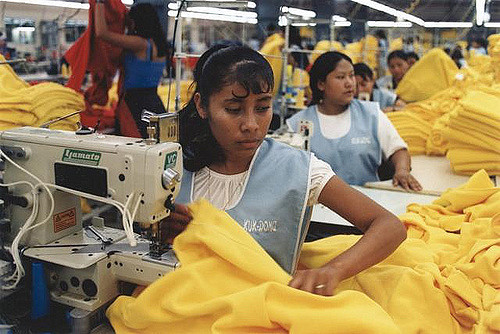This post was submitted to Manual RedEye by Michael Harris (12, MST), a senior at duPont Manual High School.
The developed world has and continues to concern itself with economic globalization in regards to the implementation of so-called “sweatshops” by multinational corporations. The conditions of these sweatshops are indeed horrid compared to the working institutions of the developed world, but sweatshops are necessary to swiftly raise the standard of living in the given developing country.
Relative to other jobs in a developing country, sweatshop jobs are much better. They often provide wages twice of that of other jobs, which include hazardous agricultural labor and prostitution. Additionally, history suggests that such conditions would not prevail forever. The majority of developed nations have gone through a period of sweatshop labor. Concern for working conditions and the human capital of children progress as the standard of living of a nation rises, as seen with every developed nation.
For example, say you were in a family of four composed of two children and two parents, in which all of you worked to maintain an annual salary of $50,000 to survive. Now, let’s say one of the parents receives a raise thus allowing the children or the other parent to lessen his or her work time. This work time could be used to invest in human capital or leisure. Either way, the raise allowed others to invest time elsewhere.
The raise simply represents any change in the factors of production, such as technology. When multinational corporations implement sweatshops in developing nations, they are streaming income into the hands of impoverished people which could be used to stimulate the economy through job creation. This income allows these people to invest more than consume. When you remove such possibilities, developing nations become isolated from the developed world, causing the perpetuation of the very poverty we are trying to alleviate.
Lastly, we must note that taking these sweatshop jobs are voluntary, despite the poor circumstances. People in developing nations could very well take the jobs previously mentioned, such as prostitution, but they often choose not to. We should respect that choice, as an infringement on such a choice is a limitation on freedom.
Featured Image Citation: Image of a sweatshop. Photo by Marissa Orton on Flickr, licensed under CC BY-SA 2.0. No changes were made to the original image. Use of this image does not indicate photographer endorsement of this article. Image link:
https://www.flickr.com/photos/28876688@N03/2697297072/




